Dreaming of an unforgettable trip to South Africa? If you’re a traveler from China, you might be wondering how to sort out your visa before takeoff. The great news is that the South Africa eVisa for Chinese citizens makes the process quicker and easier than ever.

In this post, I’ll walk you through what the eVisa is, who can apply, how to submit your application, how long you can stay, and a few common mistakes to avoid. You’ll also find some practical travel advice to help make your visit smooth and stress-free.
Can Chinese citizens apply for a South Africa eVisa?
Yes — Chinese citizens can apply for South Africa eVisa. The government officially launched its eVisa system in February 2022, and China was one of the first countries mentioned.
Here’s a bit of background:
- The policy change means applicants from China do not in all cases need to physically visit an embassy or consulate just to obtain a short-stay visa.
- That said, while the system is designed to be user-friendly, some sources still warn of ambiguous guidance or delays.
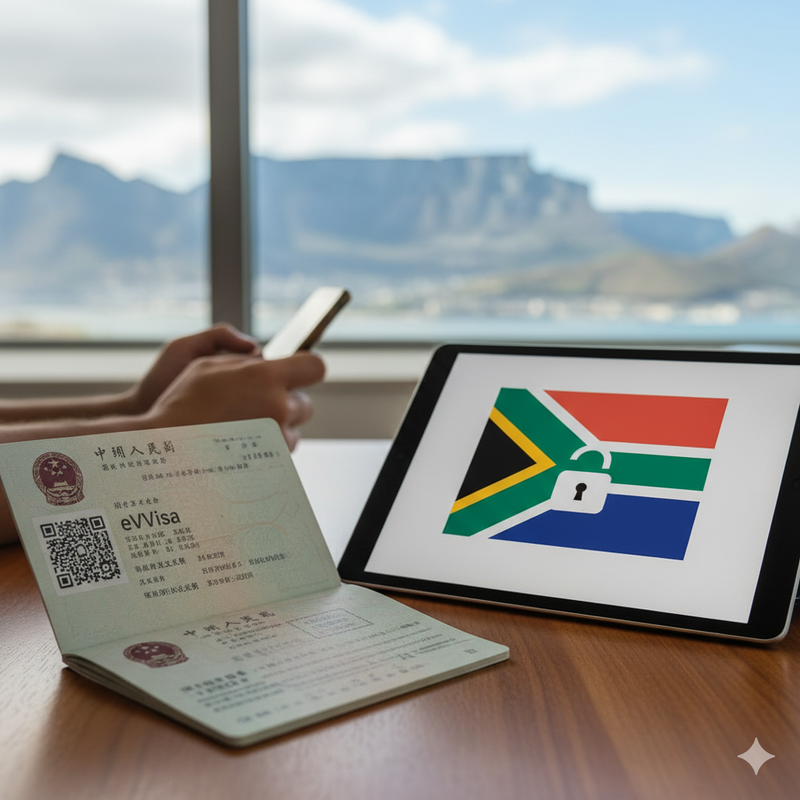
So, if you hold a Chinese passport and plan to travel to South Africa for eligible purposes (more on that next), the eVisa route is available to you.
What types of travel purposes are allowed with the South Africa eVisa?
Understanding why you’re travelling is just as important as the how. With the South Africa eVisa, Chinese citizens (and other eligible nationals) may apply for travel under a variety of permitted purposes. Some of the common ones include:
- Tourism, sightseeing, holiday-travel.
- Business meetings, trade exhibitions, fairs.
- Visiting family or friends.
- Attending short-term events or conferences, religious visits, medical consultation.
However, it’s important to note: the eVisa is not typically for long-term work, full employment or residency. If you intend to work long-term, study for a long period, migrate, or engage in formal employment, you may need a different kind of visa. Some sources still indicate uncertainty for Chinese citizens about the exact stay/duration for each purpose, so always check the most recent official guidance.

In short: if your trip is short, clear in purpose (holiday, business, family), and you meet the other conditions, then yes – you’re good to apply for the South Africa eVisa.
What is the process to apply for a South Africa eVisa online?
Here’s a user-friendly walkthrough of how to apply for a South Africa eVisa step by step. Think of this like how I would do it if I were travelling from China.
Step 1: Required your documents and details
Before you begin the online form, make sure you have:
- Your valid passport (see the next section for specifics)
- Details of your travel: arrival date in South Africa, intended accommodation, return/onward ticket.
- Proof of funds (bank statements, etc).
- Clear digital files of your passport photo, scanned passport bio page, etc.
- If required: invitation letter (for business/family), travel itinerary, proof of accommodation.
- If you’re coming via a country with yellow fever risk, the yellow fever vaccination certificate may be needed. Although for Chinese travelers this often doesn’t apply.
Step 2: Fill in the online application
- Visit the official eVisa portal for South Africa (or the platform specified for Chinese applicants).
- Complete the form: personal data, passport number, nationality (Chinese), travel purpose, arrival/departure dates, etc.
- Upload the required documents.
Step 3: Pay the fee
- After submission, you’ll pay the visa fee online (credit/debit card or as specified).
- Keep your payment receipt.
Step 4: Wait for processing
- Once submitted, your application goes through adjudication. Processing Time for South Africa eVisa is 30-35 working days, depending on workload.
- You may receive notifications if additional documents are needed.
Step 5: Receive and print your eVisa approval
- On approval, you’ll receive the eVisa document via email (or download link).
- Print a copy (preferably colour) and carry it with you when travelling to South Africa.
Step 6: On arrival in South Africa
- Present your passport and the printed eVisa authorisation to immigration officers at the point of entry.
- They’ll stamp your passport based on the visa details.
- Be prepared to show your return ticket, proof of accommodation, funds if asked.
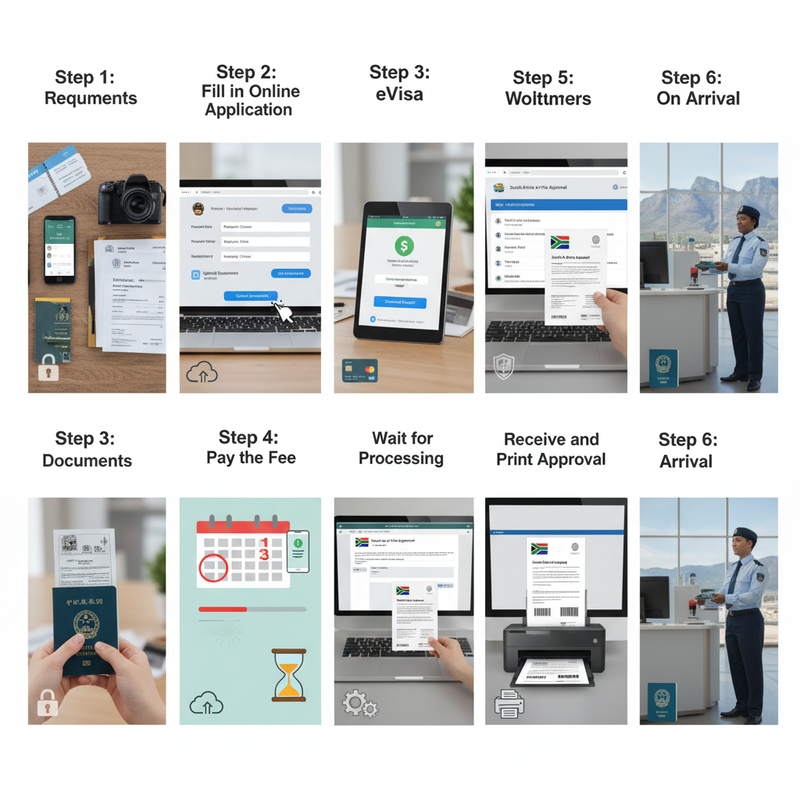
What are the passport requirements for the South Africa eVisa?
Your passport’s condition is key—one small discrepancy and you might run into trouble. Here are the typical passport requirements for Chinese citizens applying for the South Africa eVisa:
- Must hold a valid Chinese passport (ordinary passport).
- The passport should be valid for 6 months beyond the date of arrival in South Africa (some sources quote minimum six months).
- The passport must have at least one blank page (if stamps are going to be added) or in some sources two blank pages.
- The details on your passport (name, number, nationality) must match exactly what you provide in the eVisa form.
- If you have changed your passport recently, some immigration officials may ask for your previous passport and previous visas.
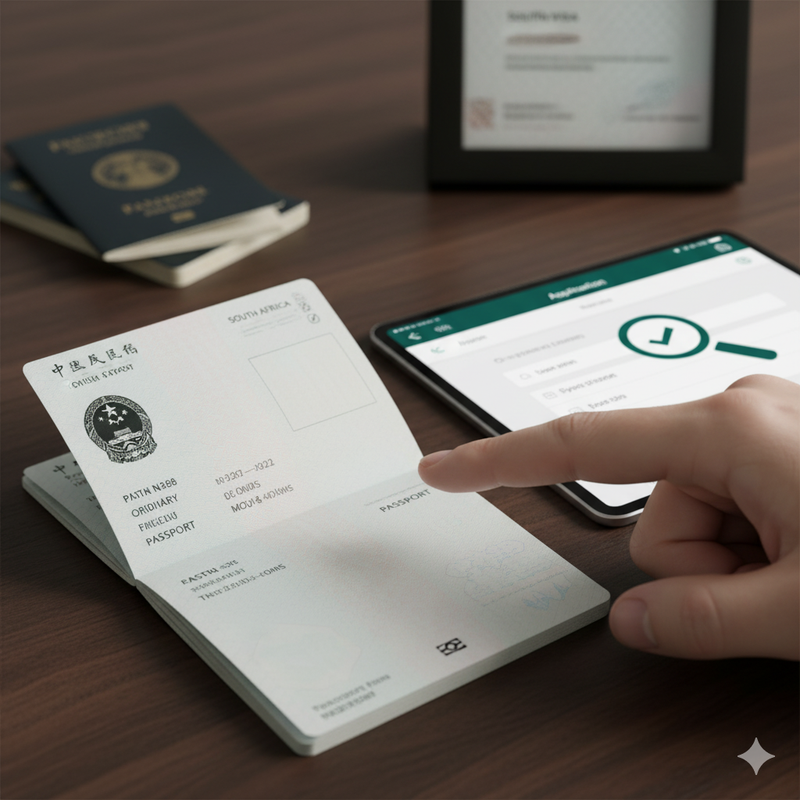
Best tip: Make sure your passport is clean, valid for the required period, and has blank pages. Clean up any inconsistencies ahead of time.
How long is the South Africa eVisa valid for Chinese citizens?
One of the questions I get most from travellers: “Once I get this eVisa, how much time do I actually have?” Here’s what the available sources say:
- For Chinese citizens, some guides say the eVisa is valid for 90 days from the date of issue.
- The stay within South Africa is commonly “up to 90 days” (though each case may vary).
- One site suggested a shorter validity: “validity: 30 days from date of issue / maximum stay: 30 days per entry” in a past iteration.

Because of these varying figures, here’s my takeaway: if you apply for the eVisa, check the exact validity period printed on your approval document—this is the one that counts. But you should reasonably expect something like up to three months from issuance and an allowed stay of up to 90 days (unless stated otherwise).
Is travel insurance required for a South Africa eVisa?
The short answer: It’s strongly recommended, but the publicly-available sources don’t uniformly say it’s mandatory for all Chinese applicants. Let’s break it down:
- In general, when travelling internationally you’ll always be doing well to have travel insurance that covers medical emergencies, trip cancellation, etc.
- For the South Africa eVisa specifically, I didn’t find a clear statement saying “insurance is mandatory for all Chinese applicants”.
- That said, immigration officers in South Africa may ask for proof of funds, return ticket, accommodation and so on—having travel insurance demonstrates you’re a prepared traveller, which only strengthens your case.
- My advice: Don’t skip it. Before you depart, get a travel insurance policy that covers your stay. If you can attach proof with your eVisa application (or keep it handy for arrival), even better.
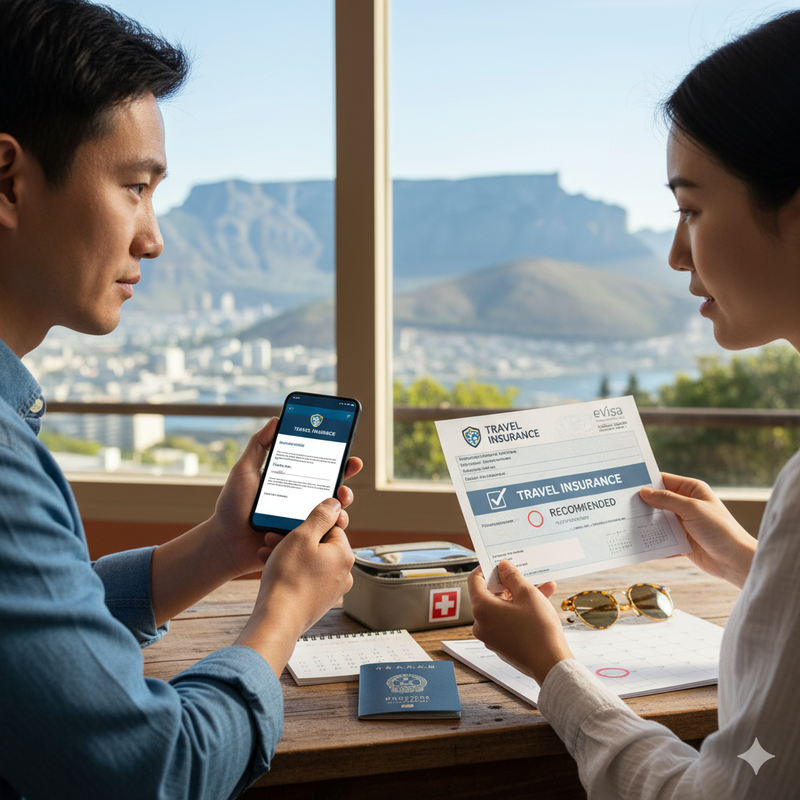
In short: Treat insurance as an essential item—not optional if you want smooth entry and peace of mind.
Is the eVisa single entry or multiple entry?
Again, this is one of those “it depends” situations. The sources I found suggest:
- The eVisa for South Africa via the portal can allow a single entry in many cases. Some sources mention “single-entry” when describing the system for Chinese citizens.
- Other sources say the eVisa is “multiple entry for tourism and business purposes.” For example, one site says the South Africa eVisa “allows you to enter the country multiple times for tourism and business purposes.”
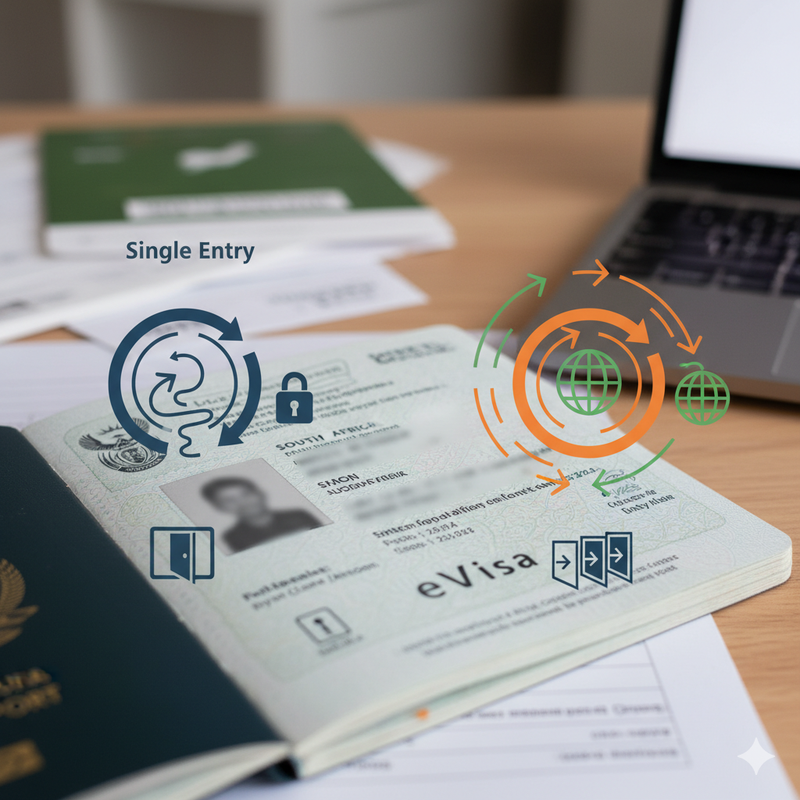
So: when you receive your specific visa approval, check if it states “single entry” or “multiple entry.” If it doesn’t clearly state “multiple entry,” assume it might only be single entry—unless you have confirmed otherwise.
Can I extend my stay in South Africa with an eVisa?
This is where things get a bit more delicate. The eVisa is designed for short-term travel under defined conditions. Thus:
- Standard guidance suggests you should not rely on the ability to extend your stay with an eVisa. The eVisa is for the stay originally granted.
- If you know in advance you want to stay longer than the allowed days, it may be wise to apply for a different category of visa (or request an extension legally via the appropriate immigration office) rather than assuming the eVisa will cover it.
- Overshooting your stay is risky: one source warns that overstaying can lead to bans from entering South Africa for 1-5 years.
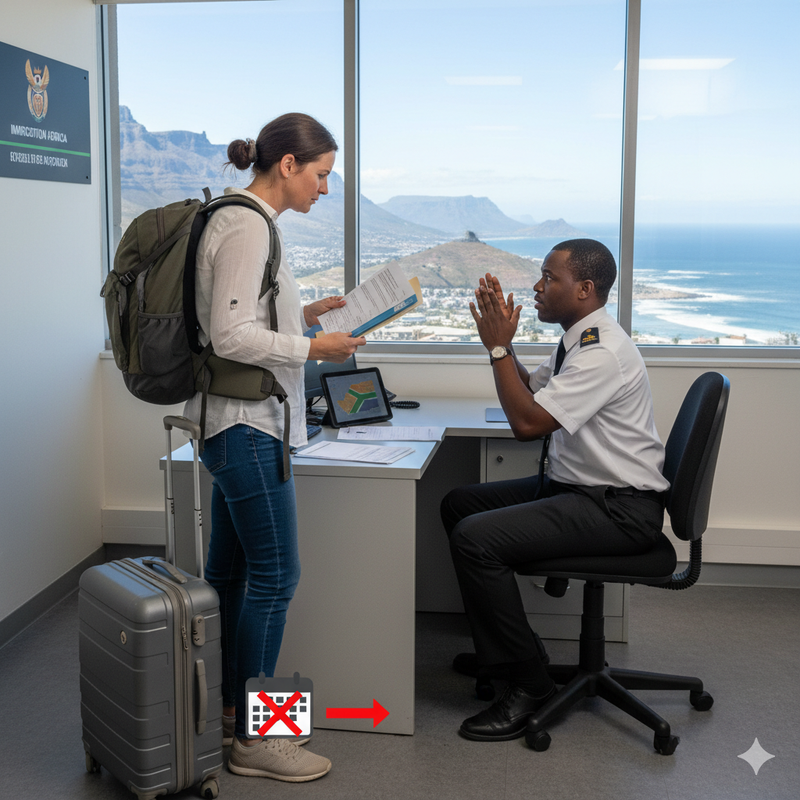
In practice: yes, a request for extension might be possible through South Africa’s immigration authorities, but it’s not the norm or guaranteed. Best to plan your trip so the approved stay covers your travel and departure.
Can I check my South Africa eVisa application status online?
Yes — you can track your South Africa eVisa status online. The process generally involves:
- Logging into the eVisa portal where you submitted your application.
- Checking the “Application Status” or “Progress Status” section for updates such as “Documents Uploaded,” “Payment Received,” “Adjudication in Progress,” etc.
- Some applicants report delays or portal issues—one Reddit user mentioned the status remained “waiting for documents” or “payment initiated” for weeks.
- If you’re facing issues (portal not updating, payment stuck), you may need to contact the relevant immigration or visa-support service for South Africa.
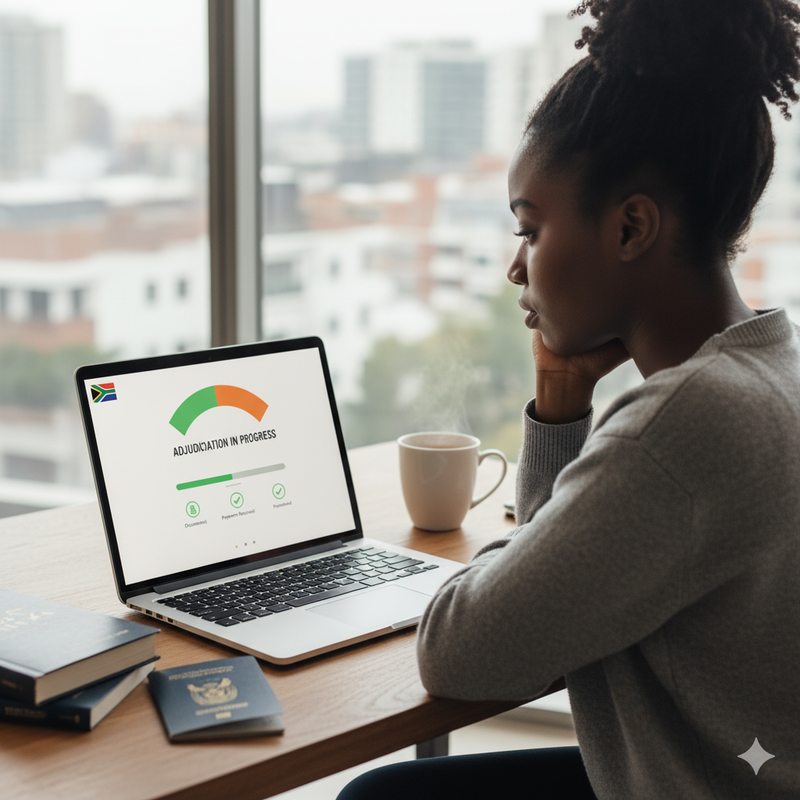
In summary: yes, status-tracking is part of the system—but make sure you apply with enough lead time in case of delays.
What are the common reasons for South Africa eVisa rejection for Chinese citizens?
Here are some of the most frequent stumbling blocks, drawn from user reports and visa-guidance websites:
- Incomplete or incorrect application form
- Name mismatch, passport number incorrect, missing or inconsistent travel dates.
- Missing required fields or uploading wrong document formats. (One Redditor: “The form kept giving an error when day > 12”.)
- Name mismatch, passport number incorrect, missing or inconsistent travel dates.
- Insufficient proof of funds
- Not providing recent bank statements, employment records, proof of income.
- If the visa officer doubts your financial capacity, the application might be rejected.
- Not providing recent bank statements, employment records, proof of income.
- Unclear or suspicious travel purpose
- If the itinerary is vague, or if the business/family visit lacks credible invitation or justification.
- If it seems the applicant might intend to work rather than visit.
- If the itinerary is vague, or if the business/family visit lacks credible invitation or justification.
- Passport issue or validity concerns
- Passport expired or not valid for required six months ahead.
- Not enough blank pages.
- Recent passport change without explanation or older passport with relevant travel history missing.
- Passport expired or not valid for required six months ahead.
- Late application or arrival date too soon
- Applying a few days before travel may raise red flags.
- Visa officer may doubt if you have everything ready.
- Applying a few days before travel may raise red flags.
- Portal glitches or payment issues
- Some users reported payment attempts failing, or portal hanging.
- Some users reported payment attempts failing, or portal hanging.
- Overstay or previous immigration history
- If you have a past overstay in South Africa or other countries, this might impact approval.
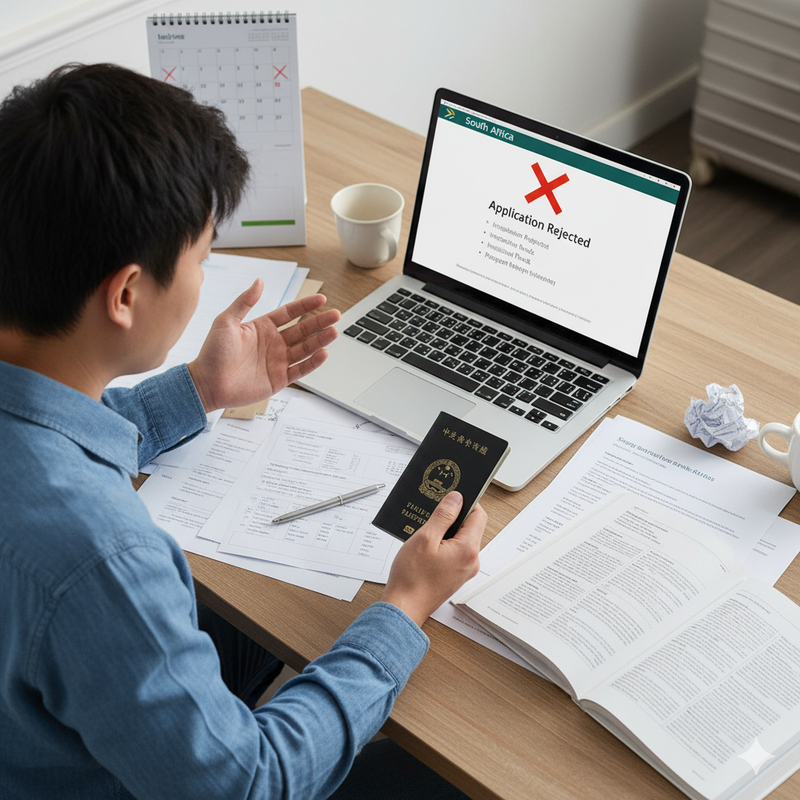
Tip: The best way to reduce risk is to apply early, double-check all information, upload best-quality documents, write a clear travel purpose letter, and keep everything coherent.
Travel Tips
While you’re organising the visa, here are some extra pointers to make your trip smoother and more enjoyable once you land in South Africa.
- Always print your eVisa: Even though it’s electronic, having a printed copy (with your travel itinerary) is wise.
- Carry your return ticket and hotel/accommodation proof: Immigration may ask you when you fly in.
- Budget extra days: To allow for potential delays, aim to apply at least 3-4 weeks ahead.
- Travel insurance: As mentioned, get it and carry proof. It’s not only wise for emergencies, but also shows you’re a responsible traveller.
- Know your entry point: Some online info suggests eVisa holders must arrive via major airports (for example, O. R. Tambo International Airport in Johannesburg).
- Respect your stay limit: Stick to the days permitted. Overstaying could lead to fines or bans.
- Monitor local health/vaccination requirements: You likely won’t need a yellow fever certificate if travelling from China directly, but if you transit through a yellow-fever zone, check.
- Document your travel history: If you’ve travelled abroad successfully before, it strengthens your case.
- Have a copy of bank statement in English: If your bank statement is in Chinese only, get a certified English translation.
- Be ready for customs/immigration questions: The officer might ask: “What is your purpose?”, “How long will you stay?”, “Where will you stay?”, “When do you plan to leave?” Be ready.
- Keep digital copies: Save your passport, visa approval, itinerary, insurance, accommodation bookings in your email/cloud so you can access them while on the move.
- Enjoy responsibly: South Africa is amazing—but remember to observe local laws, carry your ID/passport when out, and stay aware of your surroundings (especially in urban zones after dark).
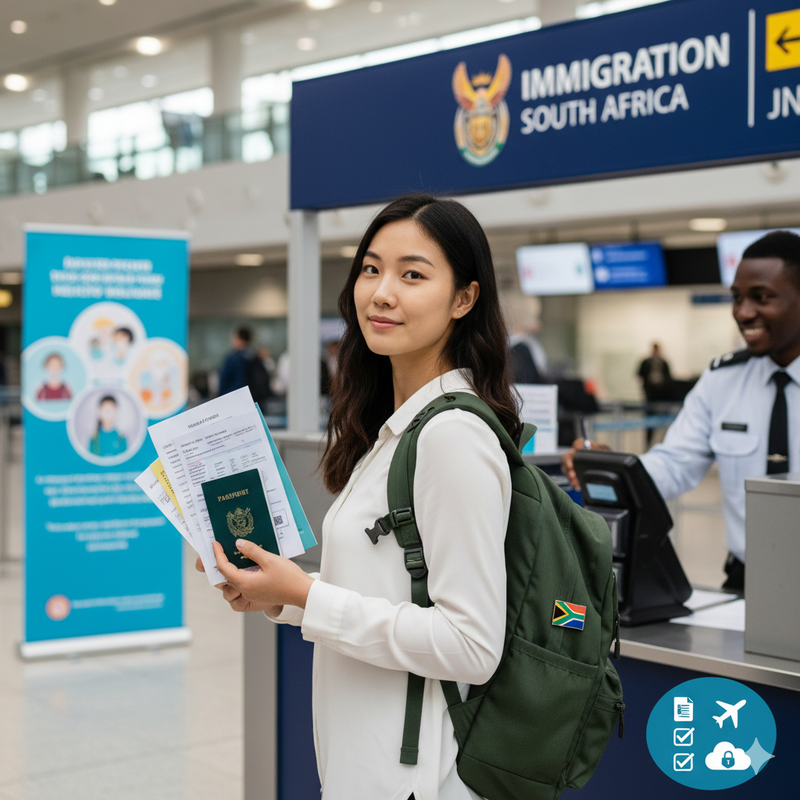
South Africa eVisa FAQs
Q: Do I need to visit the South African embassy in China to get the eVisa? A: No, for eligible Chinese nationals applying via the eVisa system you generally do not need to visit the embassy or consulate in person. The online process is intended to remove that requirement.
Q: How soon can I receive my approval after applying? A: It varies. Some sources say as low as 10 working days; others say up to 20-30 working days. Because delays happen, apply as early as possible.
Q: Can I travel on the eVisa, exit South Africa and re-enter under the same visa? A: That depends on whether your visa is issued for single or multiple entries. You must check the specific wording of your visa approval. If it’s “single entry”, you cannot exit and re-enter under that visa.
Q: If my travel dates change after I’ve been approved, what do I do? A: If the change is small (e.g., move arrival by a few days), you may travel as long as you enter before the “valid until” date on your eVisa. But if your travel is delayed by many weeks or you plan a longer stay than allowed, you may need to reapply.
Q: What happens if I overstay my eVisa? A: Overstaying can result in serious consequences: fines, removal, future entry bans (1-5 years) or being refused entry next time. One guide explicitly warns Chinese citizens to avoid overstaying.
Q: What if my eVisa application is rejected? A: You should receive notification of rejection and reasons (though in practice some say communication is weak). You may reapply, but make sure you correct the issues (e.g., incomplete form, lack of funds, mismatched data). Some recommend waiting a few weeks before re-applying.
Q: Is the visa fee the same for everyone? A: Not exactly. The fee depends on your nationality, type of visa, number of entries, and sometimes processing speed. For Chinese citizens, there may be a standard fee (one guide quotes) plus any agent/service fees.
Q: Does the eVisa guarantee my entry at the border? A: No — having the visa means you may travel, but final entry depends on the immigration officer at the point of arrival. They may ask questions, check documents, and stamp you in accordingly. Be prepared.


